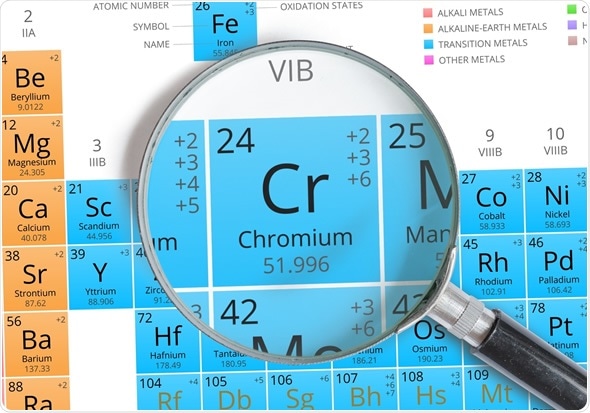Chromium (Cr) is among several essential trace elements. Chromium optimizes insulin function and can have a marked impact on the metabolism of carbohydrates, proteins, and lipids.
However, there has been much debate on the biological role of chromium. In fact, the scientific evidence has been mixed as to whether chromium supplementation can have a beneficial impact on controlling blood glucose levels, weight loss, or diabetes, among other conditions.

Image Credit: vchal / Shutterstock.com
Controlling blood sugar
In type 2 diabetes, although the pancreas is producing enough insulin, maintaining adequate control of glucose levels becomes difficult. Type 2 diabetes sets in when tissues and muscle cells start to resist insulin. Researchers have investigated how chromium supplementation can impact people with type 2 diabetes.
Chromium does not appear to have a major influence on the metabolism of lipids or glucose in non-diabetics. Scientists must therefore undertake higher-quality studies before any specific claims can be determined about how chromium impacts non-diabetics. Although chromium has been found to significantly improve hyperglycemia among patients with diabetes, additional research is needed on this front as well.
Insulin receptor kinase
Chromium has been found to improve in vivo insulin activity, which optimizes tolerance to glucose. However, scientists have not confirmed the mechanism involved in this process.
In an effort to elucidate this mechanism, investigators have learned that pretreating Chinese hamster ovary insulin receptor cells with chromium intensify insulin receptor tyrosine phosphorylation. To this end, the researchers used chromium-treated cells to prepare purified plasma membranes. These membranes were found to retain greater levels of insulin-dependent kinase activity as compared to controls.
Taken together, the results of this study found that cellular chromium increases insulin signaling by expanding insulin receptor kinase activity. Moreover, a combined approach that incorporates both medications and certain nutritional recommendations could potentially address insulin resistance, which is an indicator of type 2 diabetes.
Weight control
For chromium, another area of scientific interest has focused on the element’s ability to control lipid metabolism and glucose levels. By controlling these substances, the belief is that the patient's weight could also be controlled by allowing this essential element to optimize the distribution of body fat and amount of lean mass.
The compound chromium picolinate is often applied as a nutritional supplement. Scientists have examined how supplementing chromium picolinate could support weight loss, change the body makeup, and lower iron levels in females who continuously consumed nutrients and energy-based products.
However, these studies found that when the subject’s energy intake was controlled, chromium picolinate supplementation on its own did not affect weight, body mass, or iron levels. Therefore, the belief that chromium supplementation facilitates the loss of weight and optimizes body makeup has not been confirmed.
Use Chromium Picolinate for Insulin Resistance – Benefits of Chromium – Dr. Berg
Muscle gain
In a double-blind trial, encapsulated chromium supplements or placebo were ingested by young men who underwent a managed exercise program for two months to improve their strength. There were no benefits for muscle or strength growth nor for loss of fat in those who took the chromium supplements as compared with those who received the placebo.
Investigators, therefore, concluded that chromium did not improve body composition. Moreover, this study also found that only individuals with low levels of chromium may benefit from supplementation.
Blood pressure
Researchers have found that rats with hypertension who were administered chromium nicotinate by oral gavage later reported a reduction in their blood pressure levels. This group later expanded their research to determine whether additional chromium compounds had an effect on blood pressure in hypertensive rats. In addition, the researchers also wanted to determine whether chromium has any antioxidant activity.
To this end, a control group of hypertensive rats was administered a low chromium diet, while five other clusters of rats consumed the same diet, but with an additional 5 ppm compounds of chromium that included nicotinate, picolinate, acetate, chloride, and nicotinic acid-glycine-cysteine-glutamic acid. The rats then drank water that contained 5% and 10% sucrose. Based on their results, the scientists determined that chromium can help optimize sucrose-induced hypertension, in addition to confirming the antioxidative properties of chromium.
Acute tubular necrosis
Scientists have connected chromium supplementation with the death of tubular epithelial cells that form the renal tubules found in kidneys. In one report, an otherwise healthy 24 years male patient who had consumed, during exercise sessions, a dietary chromium supplement for two weeks, presented with acute kidney injury. Subsequent imaging studies revealed only a right functioning kidney, while a later biopsy confirmed the presence of acute tubular necrosis.
In this patient, renal impairment set in, which subsequently caused the patient to require hemodialysis in addition to other therapies. Ultimately, the patient recovered and retained normal kidney function.
The main components in the supplement that the patient had previously consumed were chromium picolinate, Sida cordifolia, synephrine, and guarana. An objective assessment by the researchers indicated a connection between the ingestion of the supplement and kidney failure.
References
Further Reading
Last Updated: Jan 18, 2023